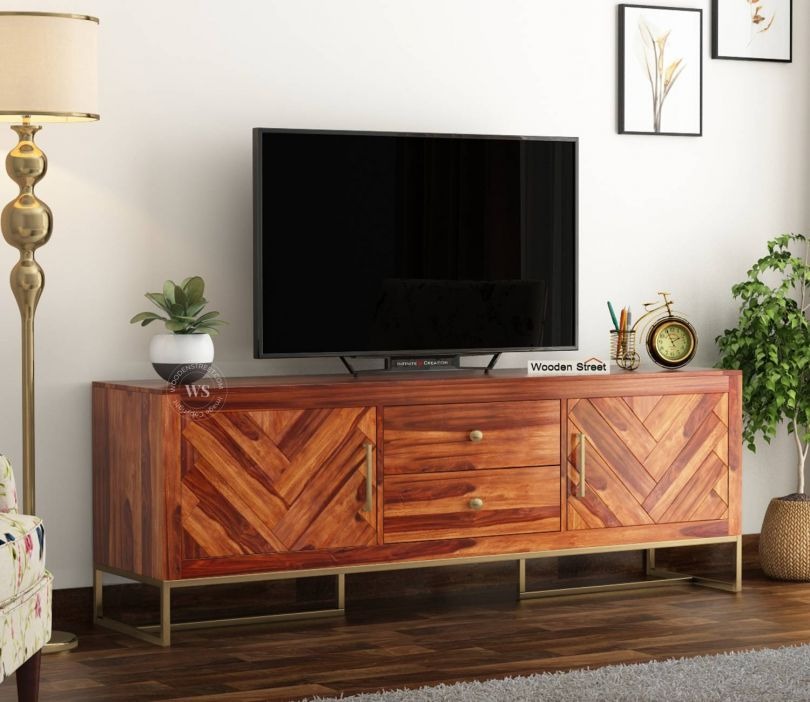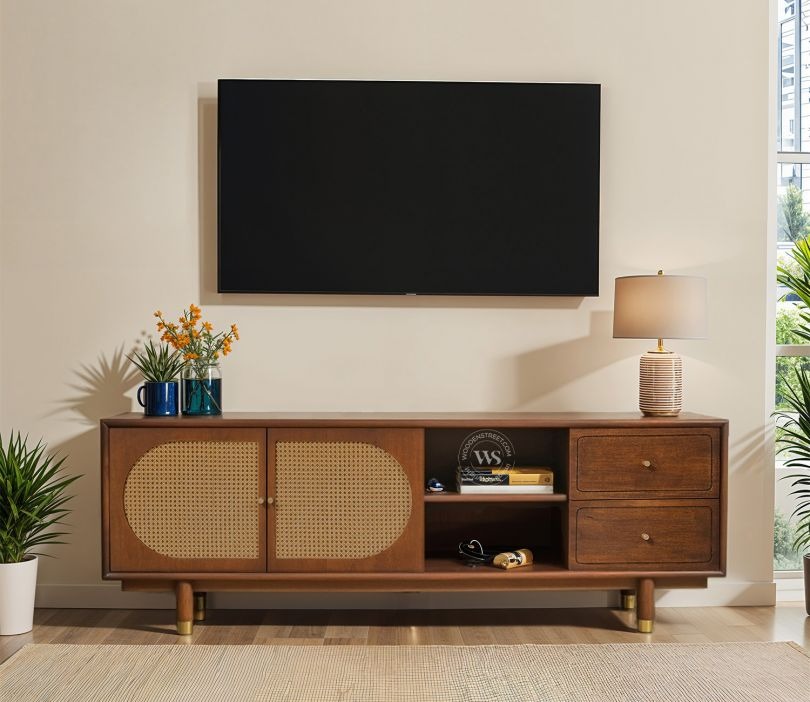Choosing the right TV unit for your living room is more than just picking a pretty piece of furniture. It’s about blending functionality, safety, aesthetics, and ergonomics—all while matching your space and viewing habits. When shopping online, you lose the tactile experience, so you must rely on smart planning and informed decision-making. In this guide, we’ll walk you through everything you need to know about choosing a TV cabinet, TV stand, or wooden TV unit so that you make a confident, lasting purchase.
Why Your TV Unit Matters
A well-chosen TV unit for living room does more than just hold your television:
-
It defines the focal zone of your room and anchors your entertainment setup.
-
It provides storage and concealment for cables, consoles, media, and accessories.
-
It ensures your TV is placed at an optimal viewing height and with safety in mind.
-
It complements your decor and enhances the overall look of your space.
Because you won’t see or touch it before delivery when shopping online, getting the right dimensions, material, style, and features beforehand is crucial.
1. Measure Everything Precisely
Perhaps the most important step: take accurate measurements.
-
Measure your TV
Measure the full width (including bezel) and depth of the television. Leave a few inches of extra clearance on each side so the TV doesn’t feel cramped. -
Measure the available space
Measure the width, height, and depth of the wall or floor space where the unit will go. Note any obstructions such as windows, sockets, switches, or vents. -
Consider viewing height and distance
To avoid neck strain, the center of the screen should sit close to your seated eye level, often around 42 inches from the floor. Ensure your seating distance matches your TV’s size the viewing distance is generally 1.5 to 2.5 times the diagonal screen measurement. -
Weight capacity & depth
Ensure the unit can support the weight of your TV and electronics. Depth should suffice so that the TV doesn’t protrude awkwardly, especially for table-top units.
Accurate measurements prevent surprises and help you choose the right fit for your room.
2. Understand Types & Styles of TV Units
Knowing the types and styles helps narrow your choices:
-
Open-shelf TV stand
Minimalist design with open compartments, ideal if you prefer easy access and don’t need to hide items. -
TV cabinet / console with doors
Combines open shelving with closed storage to hide clutter. Some cabinets have glass doors for remote access. -
Wall-mounted / floating console
Gives a modern, floating effect and frees up floor space. -
Corner units
Designed to fit snugly into room corners, useful for unconventional layouts. -
Entertainment center / wall unit
Larger modular systems may include upper shelving, bookcases, or side cabinets. -
Wooden TV units
Made of solid wood or engineered wood, these units lend warmth, durability, and versatile finishes.
Each style has pros and cons, so choose based on space, storage needs, and décor preferences.
3. Pick the Right Material & Finish
Material affects durability, aesthetics, maintenance, and cost:
-
Solid wood
Premium, sturdy, and long-lasting. Easily refinished and ideal for classic or rustic décor. -
Engineered wood / MDF / plywood
Affordable alternatives that are lighter and often finished with veneers for a polished look. -
Metal / steel frames
Offer a modern or industrial look, usually combined with wood or glass elements. -
Glass / tempered glass
Sleek and contemporary, though glass requires frequent cleaning and can be less forgiving for heavy equipment.
Selecting the right material ensures your TV unit is both functional and visually harmonious with your living room.
4. Functionality & Storage Features
A TV unit isn’t just for holding your screen. Consider functionality:
-
Shelves and compartments
Provide space for set-top boxes, gaming consoles, DVD players, routers, and remotes. -
Closed storage
Drawers or cabinets hide clutter. Glass doors allow remote signals through. -
Cable and wire management
Built-in cutouts or channels help route cords neatly behind the unit. -
Ventilation
Electronics generate heat. Ensure compartments have airflow. -
Adjustable shelves
Flexibility to change shelf spacing accommodates new or larger devices. -
Openings for power outlets
Some units include built routing for cables, making setup cleaner.
Check product specifications online to confirm these features before purchasing.
5. Safe Viewing & Ergonomics
Your TV should be comfortable to watch:
-
Eye-level placement
Align the screen’s center with your seated eye height. -
Tilt or swivel options
Helpful for reducing glare or adjusting the viewing angle. -
Prevent tipping
Ensure stability. Tall or top-heavy units may require wall anchoring. -
Center alignment & balance
The stand should be slightly wider than the TV for stability and visual balance.
Proper ergonomics prevent discomfort and make watching enjoyable.
6. Style & Design Considerations
Your TV unit should blend with your living room décor:
-
Match finishes and tones
Complement your existing furniture and flooring with the unit’s color and finish. -
Choose a coherent style
Stick to modern, rustic, industrial, Scandinavian, or transitional styles for harmony. -
Proportion matters
Ensure the unit fits the wall size and doesn’t overpower or get lost in the room. -
Symmetry & balance
Arrange decorative items around the TV to create visual balance. -
Accent lighting
Some units have built-in LED strips to enhance the viewing experience.
A well-styled TV unit elevates the entire room’s aesthetics.
7. Online Shopping Tips & Red Flags
To avoid disappointment when shopping online:
-
High-resolution images & diagrams
Examine multiple angles and product sketches. -
Check product specs and weight limits
Confirm that the unit can support your TV and accessories. -
Read reviews and user photos
Real-world feedback can reveal durability and quality issues. -
Return policies and assembly instructions
Ensure there’s a flexible return window and clear instructions. -
Verify material claims
Understand the difference between solid wood and veneered engineered wood. -
Confirm hardware & accessories
Make sure screws, brackets, or cable management parts are included.
Being vigilant reduces the risk of receiving a unit that doesn’t meet expectations.
8. Common Mistakes to Avoid
-
Buying a unit narrower than your TV
-
Neglecting cable management
-
Choosing fully enclosed compartments without ventilation
-
Ignoring the viewing height
-
Overlooking weight capacity
-
Picking a style that clashes with existing furniture
-
Obstructing walking space or doors/windows
-
Overlooking return policies for online orders
Avoiding these mistakes ensures a smooth buying experience.
9. A Sample Buying Journey
Here’s a step-by-step approach:
-
Measure your TV and space carefully.
-
Decide on your preferred style (floating, cabinet, open shelves).
-
Select material and finish that match your décor.
-
Consider storage needs and cable management options.
-
Confirm viewing height and ergonomics.
-
Read product reviews and check return policies.
-
Place the order online with confidence.
By following this structured approach, you can purchase a wooden TV unit, TV stand, or TV cabinet that’s functional, stylish, and a perfect fit for your living room.
Conclusion
Buying a TV unit online can seem daunting, but with careful planning and attention to detail, you can make a smart, lasting choice. From measuring your space to selecting the right material, style, and storage features, every decision matters. A well-chosen TV unit for living room not only supports your television but enhances the overall aesthetics and functionality of your home. Take your time, consider your options, and shop confidently to create a seamless entertainment setup.


